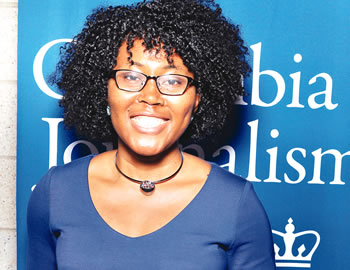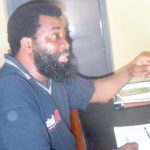The fourth estate is a male-dominated profession where only strong and courageous women make it to the top. Jennifer Ehidiamen, a onetime John Hopkins University’s International Reporting Project grant recipient, recently received 2016 Foreign Press Association (FPA) Scholarship Fund award. She tells RONKE SANYA, what makes her tick, in this interview.
Why did you embrace journalism and why are you so passionate about rural reportage?
Growing up, I had other ideas of what career I wanted to pursue, law was top on the list. But somehow along the line, I decided to focus on my area of strength, which is writing and communication. Journalism has over the years given me an incredible opportunity to tell human-interest stories for the purpose of inspiring our world and pursuing just cause.
When I first saw a full-page published article that I wrote in 2006 for the Comet newspaper, I was elated. Seeing my work in newsprint stirred up a desire to write more. So when I got the opportunity to serve as a weekly columnist in one of the national newspapers in Nigeria, I grabbed it with both hands. Having a regular platform to write about issues that I care about throughout my years as an undergraduate kept me on the path and amplified my voice in the industry. In 2013, I had the opportunity to report on health and global development with a grant from John Hopkins University’s International Reporting Project. I spent one year reporting on Human Immuneodeficiency Virus (HIV) and other health related issues, especially from underserved communities. During my National Youth Service Corps (NYSC) in Nasarawa, I heard about and saw a lot of social issues that never made it to the mainstream media in Nigeria due to its lack of commercial value. But these stories are important. Rural lives and issues matter and should be given adequate coverage as with other stories. In my own way, I try to cover some of these issues when I report.
How does it feel being one of the winners of the 2016 Foreign Press Association (FPA) Scholarship Fund Awards?
It is very exciting, especially because when I entered for the competition I was pursuing a very difficult degree programme that almost made me lose confidence in myself. I can remember when they called me over the phone to inform me that I emerged as one of the winners it took a while to connect to what exactly the lady was talking about. It is one of those competitions one would enter for and just forget about because you know there are hundreds, if not thousands, of intelligent international students from all over the world also putting in an entry. So when I received the congratulatory call, I was pleasantly surprised and thankful to God for showing me favour. Foreign Press Association (FPA) Scholarship comes with good benefits, which I actually need for the new phase of my career.
Reporting rural activities must be quite challenging. Share with us a memorable experience you had while in the field sourcing for news.
I don’t only report on rural activities from villages but I do have an interest in rural reporting, which was first stirred up in 2006 when I had the opportunity to volunteer with a team of presenters and producers, led by Mr Wika Gofwen at PRTV in Jos. The programme, ‘Rural Watch’, was like a social diary that amplified issues affecting rural communities in Plateau State. These producers travelled into deep villages and communities. One experience that I will always remember is the trip to a village called ‘Doc Pai’ [not sure about the spelling]. We spent close to three hours just crossing a huge mountain by foot to get to this village and meeting people who were quite content being far away from civilisation and the hustles attached to materialism. This experience is not for the fainthearted.
You have many other honours to your credit, including the 2009 Atlas Service Corps Fellow; Nigerian National Youth Leadership Award, LEAP Africa 2010; 2013 Innovative Young Journalist Award, among others. How fulfilled does this make you feel and how do you keep having a new story to tell?
All these honours are to the glory of God. Sometimes I really don’t feel like I have started at all. It all looks like test-drive for the bigger things to come. So I don’t let this get into my head at all because I am just getting started. I am inspired by many things and many people. So when I do something which God blesses with a good reward, I am inspired to keep pushing for more.
On developing new story ideas, it can develop from a simple gist that I hear in a danfo, which I then do more research on it to find the news value in it. Other times it is just by talking with an expert to get an idea on what the trends are in a particular sector or an issue.
But there are times generating a fresh story idea is just a hard nut to crack. You just have to keep pushing yourself and pitching different ideas until one clicks.
How will you encourage Nigerian youths who believe they can’t make it through and blame the government for their misfortunes?
It is such a time as this that Nigerian youths must press on and not give up. Sometimes we tend to believe that it is a shameful thing to struggle to achieve what we want. The struggle today can become part of a growth process instead of making it a pool of bitterness and anger. There is no shame in doing what you need to do [the good] in order to get to where you want to get to or need to be. It becomes problematic when we put very little efforts in something and expect big results or wanting to achieve great things in life without working hard for it. That is pure greed and foolishness that this generation must avoid. Life in Nigeria, or anywhere else for that matter, is like a blank canvas. Each of us has the ability to paint the kind of picture [life] we want. Sometimes, we fall into the trap of blaming others for shortfalls, bad experiences or the bad pictures/outcomes when we attempt something instead of taking responsibility, learn from the mistake, and work harder and smarter to get better results.
But I must acknowledge also that Nigeria is a somewhat hard country, you know. One minute you are working hard, the next it looks like all the demons from hell are building a barrier against your efforts. But still, as young Nigerians, we must not give up because a lot depends on our rising. Keep your family values and relationships in check and don’t stray from the path, take advantage of the high mobile and internet penetration to expand your horizon through e-learning, take advantage of volunteering opportunities to learn by doing, travel outside your community to see other cultures and challenge your norm. Most importantly, let us be that generation of excellence that can contribute to Nigeria’s successful rise above corruption and injustice. Yes, we can!
Tell us about your early years.
I was born in Edo State to an amazing family. We [my mum and siblings] moved to Lagos in the 90s. Growing up, I enjoyed the privilege of being called a teacher’s daughter and all the extras that came with the title, such as not paying for PTAs levy or not being punished by other teachers. I saw my mum win a few awards and recognition for being an excellent teacher. From my mother, I learned about the strength of a woman. Now retired, she served in civil service for 35 years. I have had one or two people stop me on the way or send me messages on Facebook to ask if I am Mrs. Ehidiamen’s daughter. They then go on and on talking about how their lives were impacted positively by her in primary school. It is very inspiring. So, I guess, I unconsciously learned the act of leading by serving from her and of course, being strong and tenacious.
In case any young person is reading this and thinking I grew up in a perfect home, no I did not. I learned early in life not to allow my background keep my back on the ground.
I attended a public primary school in Lagos and a boarding junior secondary school at the Federal Government Girls College (FGGC), Benin City. I later returned to Lagos to complete my senior secondary school at Ikeja High School, one of the most populous public secondary schools in Ikeja back in the 2000s. Joining the press club then helped me integrate well into the system. It was all an interesting experience. I should probably add that knowing the way to church as a child had a positive influence on me too. So, if you ask some of the top influences that shaped my career directly or indirectly, I would say good books, family, church, and a few other people.
WATCH TOP VIDEOS FROM NIGERIAN TRIBUNE TV
- Let’s Talk About SELF-AWARENESS
- Is Your Confidence Mistaken for Pride? Let’s talk about it
- Is Etiquette About Perfection…Or Just Not Being Rude?
- Top Psychologist Reveal 3 Signs You’re Struggling With Imposter Syndrome
- Do You Pick Up Work-Related Calls at Midnight or Never? Let’s Talk About Boundaries





